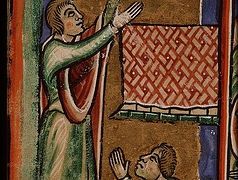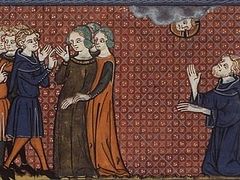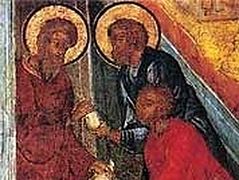Source: Eastern Christian Insights
February 27, 2016

1 Cor. 6: 12-20
Luke 15: 11-32
Family relationships shape us all profoundly. Our sense of what it means to love and to be loved, of how we should treat others and what we should expect from others, is shaped by our relationships with those who cared for and guided us in our formative years, as well as by those with whom we share our lives today. For good, bad, or somewhere in between, our family members are part of who we are.
It is not surprising, then, that the Lord told a story about a father with two sons in today’s gospel lesson. The Church calls today the Sunday of the Prodigal Son in order to help us see more clearly who we are in relation to our Heavenly Father as we prepare for Lent. For no matter how far we have run away from our identity as the beloved children of God, He desires our restoration. He runs to greet the repentant sinner and welcomes us back into the family.
Certainly no one in that time and place would have expected the father in the story to do anything like that. Even the prodigal son himself asked only to become a servant in his father’s house, for he knew what he had done by asking for his inheritance. He had basically told his father that he meant nothing to him but a source of money. And since the old man would not hurry up and die, he wanted his inheritance so that he could have nothing more to do with him ever again. Perhaps the father knew that the son needed to learn from the consequences of his tragic mistakes. So he gave him the money, which the son quickly wasted in partying and immorality. Soon no one treated him like a son, but instead like a lowly servant so miserable that he would have happily eaten the slop fed to the pigs.
At that point, the young man came to himself and realized what he had done and how wretched he was. He knew that he had dealt a fatal blow to his relationship with his father, but maybe the old man would still receive him back as a servant. As he came close to the house, however, the young man was amazed to see his father running out to greet him and then to restore him fully as his son. He did not speak a critical word to the young man, but only showed him love and rejoiced that a lost son had returned home, that one who was dead to him had been restored to life.
As we prepare for Lent, we must learn from this parable that there are no limits to our Lord’s mercy, no restrains on His compassion or forgiveness for those who humbly take the journey home. Our Lord, God, and Savior Jesus Christ is the Second Adam Who came to restore us as the children of God, as those created in the divine image and likeness. Consequently, we must not avoid repentance out of fear that God will reject us, that we alone are somehow so wicked that He would never welcome us back. Remember that the Father is not a harsh, stern, hateful judge who is out to get us. Likewise, the Son did not come to condemn and punish, but to save. He accepted and blessed everyone who came to Him in humble repentance during His earthly ministry, including corrupt tax-collectors, a woman caught in adultery, Gentiles, the demon-possessed, and His own apostles who had denied and abandoned Him. Christ even prayed for the forgiveness of those who nailed Him to the Cross. His mercy will extend to us also if we will turn to Him from the depths of our hearts.
This familiar parable should make us uncomfortable, for it reveals truths that we would rather not acknowledge. Namely, we are all prodigal sons and daughters, having foolishly rejected our true identity as God’s beloved children. We have all placed pride and self-centered desire before preserving a proper relationship with our Father and our brothers and sisters. And as a result, we have all made ourselves and others miserable in ways large and small.
St. Paul knew that the children of God are called to blessedness, not misery. That is why he reminded the Corinthians that their bodies were temples of the Holy Spirit. In every dimension of our existence, Christ calls us to holy joy, not to self-indulgence that alienates us from Him and even from our true selves. That was what happened to the prodigal son. After abandoning his father and family for the love of money, he was so addicted to pleasure that he ended up literally in a pig sty with no human dignity at all. And since the Jews considered pigs to be unclean, the Lord makes clear that this fellow had truly hit rock bottom.
Perhaps we cannot imagine something like that happening to us, but we must be careful not to minimize the gravity of even what appear to be small sins. For the more comfortable that we get in choosing ourselves over God and neighbor, the less attuned we will be to how what we say, think, and do every day weakens us in our ability to live faithfully. The subtle temptations are often the most dangerous. We can ruin any human relationship through a settled habit of self-centeredness or thoughtlessness, no matter how insignificant and ordinary our words and deeds may seem. The same is true in our relationship with the Lord.
When we do that, we essentially ask for our inheritance and then use God’s blessings however we please. We end up living as though God were dead, as though He were no longer our Father and we were no longer His children. If it is not clear that our passions put us all at risk for such an outcome, then we desperately need the spiritual disciplines of Lent to help us come to our senses. If we do not recognize ourselves in the prodigal son, then we really need to wake up and put ourselves in the place where we can begin the journey home to the Father. Otherwise, we will end up in a pig sty of one kind or another, enslaved to our sins and with no dignity or holy joy.
There is another character in the parable for us to consider also. The elder brother refused to join in the celebration for his brother’s return. He complained that the father had never thrown a big party for him, even though he had always obeyed him. When the father referred to the prodigal as “your brother,” the elder brother would only call him “this son of yours.” Apparently, he no longer viewed him as a brother.
The irony is that, at the end of the parable, the prodigal has been restored to a right relationship with his father, but the elder brother has become estranged from them both. He refused to share in his father’s joy and to accept the return of the prodigal. He shut himself out of the celebration. We do not know the outcome of the story, but countless family relationships have ended over much less.
Remember that the Lord told His disciples to be “perfect as your heavenly Father is perfect,” especially in loving enemies. (Matt. 5:48) The elder brother fell short of the father’s perfect love in this parable, and his attitude is just as dangerous as the actions of the prodigal, if not more so. Like the Pharisee who praised himself in the temple and condemned the tax collector, this man boasted of being the perfect son and viewed himself as far superior to his erring brother.
When we remember how Christ defined sins such as murder and adultery, it should be clear that no one is in the position of being a self-righteous judge, for our hearts are not pure. (Matt. 5:21ff.) We need Lent in order to wake ourselves up from the prideful illusion that we are already perfect and thus somehow justified in holding grudges and refusing to be reconciled with our enemies, even if they are our own spouses, parents, children, or siblings.
Both the prodigal and the elder brother needed to be reconciled with their father. The same is true of each and every one of us this Lent. We will gain the spiritual strength to do so through prayer, fasting, almsgiving, and other spiritual disciplines. These are tools to help us come to ourselves, to wake us up and lead us back to a right relationship with our Heavenly Father. No matter whether we identify more with the older or the younger son, our Lord’s calling to us is essentially the same: Come home and join in the great celebration of the Heavenly Kingdom.



